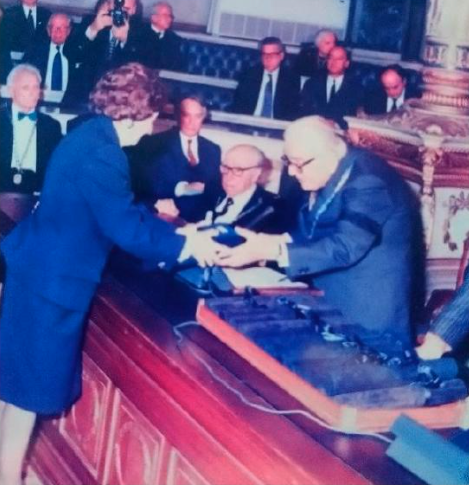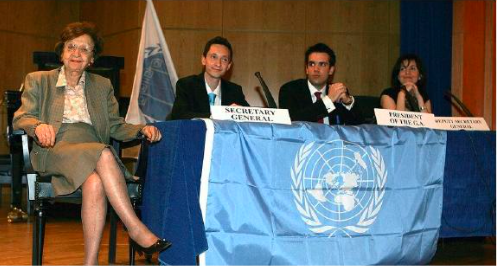A different “influencer” on the occasion of the award on December 10 – First female director of an international organization worldwide – Number of awards
On November 27, 1895, the Nobel Prize is established, perhaps the greatest honor in the world. On December 27, 1919, a small girl was born in the city of Volos in the three-story house of Vassilis and Irene Brisimis. A few months later, she was baptized Chariklia – Elli, to be called by everyone thereafter Haris. This little girl followed a unique path of life, a model for inspiration, as she became the first female Director of an International Organization in the world, she was honored for this capacity with the Nobel Peace Prize, but also with many other prizes.
But how did this Greek woman get there, and even in those years?
The third child of Irene Skarimbas, daughter of Ioannis Skarimbas, a mill owner originally from Constantinople, and Vassilis Brisimis, a cotton and brisimi merchant (goldsmith – hence the name) based in Alexandria, Egypt, spent his first carefree childhood and student years in Volos to then be interned at the American School College, in the area of Hellinikon.
The years that followed were hard and difficult: World War II, Occupation, Civil War… Hari Brisimi became active immediately after the war, in 1945, in UNRRA, the then United Nations organization for financial aid to post-war Greece with the support of the USA. With a scholarship she secured as an excellent student, she left in 1946, a woman alone in the heart of the Civil War, for the United States and attended Smith College in Massachusetts until 1948, studying Sociology. From 1948 to 1951 she continued her studies at Columbia University in New York specializing in refugee issues and Community Organization. Returning to Greece, he was hired in 1952 at the then Ministry of Coordination (with Panagis Papaligouras as minister) and dedicated himself to the rehabilitation of Civil War refugees, infrastructure and housing construction. In 1955, she was offered a job at the United Nations, specifically at the United Nations High Commissioner for Refugees, UNHCR, an offer she accepted and continued to work from Greece for the International Organization. In 1962, however, she was transferred to the organization’s headquarters in Geneva, where she lived permanently until 1988, to assume various responsibilities within the Organization, such as being responsible for the Latin American zone and also the position of Director (Advisory, Training and Resettlement ) from 1978 to 1981, shortly before her retirement in 1982, while until 1988 he continued to give on a voluntary basis. She was the first female Director of an International Organization worldwide, at a time when women in such positions were something unknown or unthinkable.
He was the man who handled the rescue of about 1100 political prisoners in the great stadium of Santiago in 1973 after the Pinochet dictatorship prevailed. And then, with the end of the war in Vietnam in 1975, as a member of the UNHCR mission there, he took over the management of the big issue that arose with the ‘boat people’, for their rescue and absorption by a number of countries, as refugee centers were set up in Laos, Cambodia and other neighboring countries.
The UN High Commissioner for Refugees honored her with the Nobel Peace Prize for her contribution to the refugee issue (for the second time) in 1981. The reference to Hari Brissimi is written on the Nobel copy signed by the High Commissioner: “To Hari Brissimi , in recognition of devoted service” (To Haris Brisimi, in recognition of devoted service).
She then divided her time between Switzerland and Greece, founding the Hellenic Council for Refugees (HRC) in 1989 (which named its newly renovated reception hall, opening in 2023) and active until the end almost of her life, in 2021, at the age of 101.5 years. She was honored for her social contribution with the Silver Medal of the Academy of Athens in 1999 and was named Woman of the Year for her social work by the Iotopoulos-Marangopoulos Foundation in 2006, while the University of Macedonia also awarded her an honorary distinction in 2007. She always remained modest and quiet, surrounded by her family (although she did not have she herself considered all the refugees of the world her children, as she said) and many dear friends. He lived a life like a movie.
On the occasion of the awarding of the Nobel Peace Prize, every year on December 10 in Oslo, it is useful to remember this Greek woman, as a pioneering and dedicated person, with a contribution but also an ethic, as a source of inspiration for the younger generations.
Source: Skai
I have worked as a journalist for over 10 years, and my work has been featured on many different news websites. I am also an author, and my work has been published in several books. I specialize in opinion writing, and I often write about current events and controversial topics. I am a very well-rounded writer, and I have a lot of experience in different areas of journalism. I am a very hard worker, and I am always willing to put in the extra effort to get the job done.












